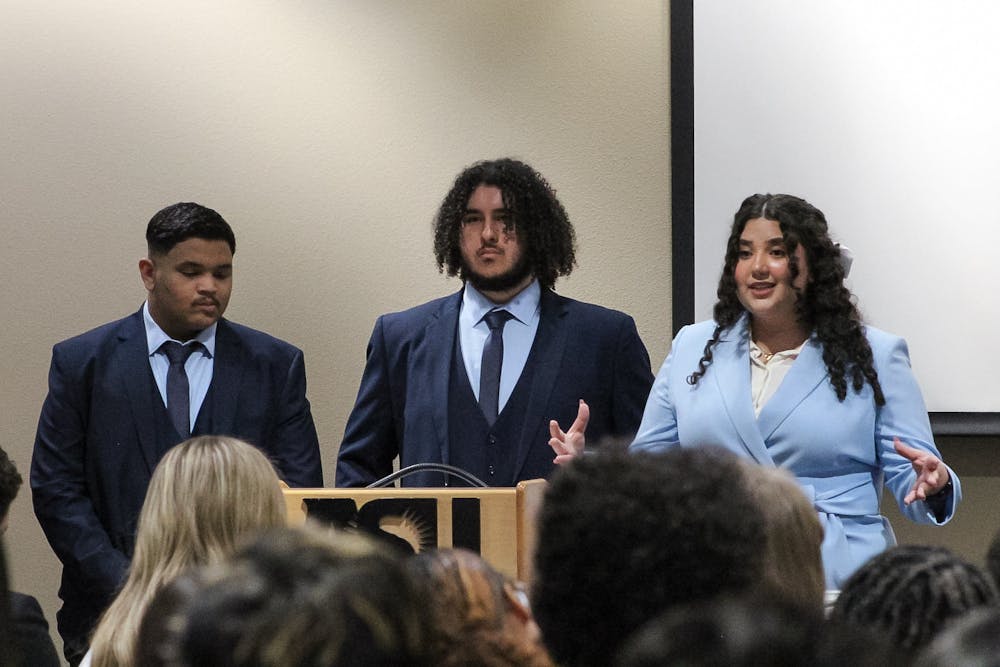Since the Undergraduate Student Government election results were announced in their entirety April 15, students on the Tempe campus have weighed the importance of their fellow classmates paying attention to University politics.
According to a memorandum released by the Associated Students of ASU, 3,632 students voted in the USG-T Executive Ticket Race this year, around 7% of the undergraduate student body on the Tempe campus.
"We're not satisfied with 7% voting turnout," Ryan Cantrill, the current USG-T chief of staff and a junior studying communication and political leadership and history, said in a statement. "But it's certainly growth from last year."
Several students involved in USG-T said they expect more from their peers when it comes to engaging in the student government elections.
"That's horrible turnout, horrible participation," Bryce Askew, a senior studying chemical engineering, said. "USG does not do a lot to engage the student body."
Askew worked as campaign staff for the Livable Campus Ticket in the most recent USG-T election season and said voting is critical for student advocacy.
"It's a good opportunity to get our voices heard by admin (University administration) and also get more information on admin to the public," Askew said. "Having people who actually care about informing the public in those positions, being in the rooms for those meetings is very helpful."
The student government uses the money to provide programs for students and student organizations that the University doesn't fund, such as the Pitchfork Pantry, Askew said.
READ MORE: USG-T takes action to support funding for Pitchfork Pantry
USG-T has a budget of just under $1 million each school year in which they can appropriate toward different areas.
"Once students start coming to these sessions and whatnot, then they can see where this money is going so that they're more aware of what the USG is doing," Jalen James, a freshman studying computer systems engineering, said.
James was elected as USG-T senator in the 2025 elections, representing the Ira A. Fulton Schools of Engineering and said he became involved with student government after he realized there were not many senators representing the Indigenous community.
"I didn't want to keep this trend of Indigenous people not being included in or represented in spaces where huge decisions are made for ASU," James said.
James said another reason for students to be involved in USG is the University's current political climate, mentioning the College Republicans United at ASU's tabling event, which promoted reporting fellow students to ICE, as an example.
"It's being swept under the rug and going unpunished," James said. "I'm fearful for what comes next, and I want to be a part of something that goes against it. I want to be secure at my college campus."
READ MORE: College Republicans United asks students to report fellow classmates to ICE this Friday
Jered Baloloy, a junior studying sports business, said he was inspired to start paying closer attention to USG-T affairs during the most recent election season.
Baloloy said USG is a place for students to look when it comes to student clubs and social events.
"It's important to look through USG for that, because, at the end of the day, they're the ones that help fund a lot of these things," Baloloy said.
Like Askew, Baloloy said the student government is the best way for students to get their voices heard by the University faculty, specifically ASU President Michael Crow.
"We want President Crow to see our views, because ... we're the ones paying tuition, right?" Baloloy said.
Baloloy said if students question the University, it will keep administration in check, discouraging them from adding fees or raising tuition.
Along the same lines, paying attention to the student government holds the elected students accountable, Baloloy said.
As for the future of USG-T's relationship with the student body, Askew said he observed participation rising throughout his time at the University.
"When I was a freshman, most seats were unopposed ... so that has changed," Askew said. "All of the elections, pretty much, are contested at this point in Tempe."
In the 2022 USG elections, all campuses had unopposed executive tickets. This year, however, three of the University's campuses had multiple executive tickets running.
Some ways Cantrill said USG-T has attempted to engage students is by advertising merchandise and enforcing promotions on social media.
"It takes efforts from USG, the University, the student body, and even the media to create a culture where student elections matter," Cantrill said in a written statement. "We're working on making elections more visible, more accessible, and more relevant to students' day-to-day lives."
Cantrill said USG-T also hosts tabling on campus to get the attention of students.
"If USG wants to open the student body, then its main project next year needs to be telling people who they are and getting people to know what USG is," Askew said.
Askew said USG only hosts tabling to connect with the student body, but must do more to get the attention of more students.
Askew said to get more students to care about USG, they must reform their funding processes, making it easier for students to get money for their clubs.
The only people who know who they (USG) are, are people who are involved with student organizations," Askew said. "(Make) the funding process easier, more intuitive and more responsive."
Edited by George Headley, Abigail Beck and Katrina Michalak.
Reach the reporter at ehprest1@asu.edu and follow @ellis_reports on X.
Like The State Press on Facebook and follow @statepress on X.
Ellis is a sophomore studying journalism and mass communication. This is her first semester with The State Press. She has also worked at Arizona PBS and Blaze Radio.




